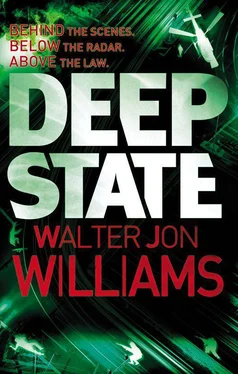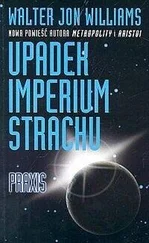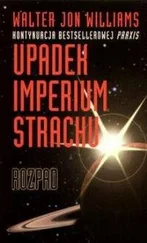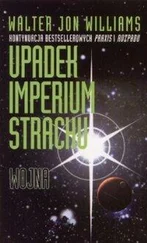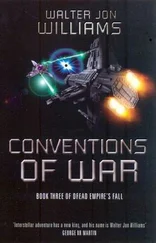Walter Williams - Deep State
Здесь есть возможность читать онлайн «Walter Williams - Deep State» весь текст электронной книги совершенно бесплатно (целиком полную версию без сокращений). В некоторых случаях можно слушать аудио, скачать через торрент в формате fb2 и присутствует краткое содержание. Жанр: Киберпанк, на английском языке. Описание произведения, (предисловие) а так же отзывы посетителей доступны на портале библиотеки ЛибКат.
- Название:Deep State
- Автор:
- Жанр:
- Год:неизвестен
- ISBN:нет данных
- Рейтинг книги:5 / 5. Голосов: 1
-
Избранное:Добавить в избранное
- Отзывы:
-
Ваша оценка:
- 100
- 1
- 2
- 3
- 4
- 5
Deep State: краткое содержание, описание и аннотация
Предлагаем к чтению аннотацию, описание, краткое содержание или предисловие (зависит от того, что написал сам автор книги «Deep State»). Если вы не нашли необходимую информацию о книге — напишите в комментариях, мы постараемся отыскать её.
Deep State — читать онлайн бесплатно полную книгу (весь текст) целиком
Ниже представлен текст книги, разбитый по страницам. Система сохранения места последней прочитанной страницы, позволяет с удобством читать онлайн бесплатно книгу «Deep State», без необходимости каждый раз заново искать на чём Вы остановились. Поставьте закладку, и сможете в любой момент перейти на страницу, на которой закончили чтение.
Интервал:
Закладка:
That afternoon Rafet successfully led a demonstration of five or six thousand in Kuulu Park, marching in a chill wind past the lake with its famous Chinese swans. The marchers each carrying a newspaper and a single shoe. Skunk Works drones saw the police response on its way, and the crowd dispersed before the police arrived. A few of the shoes were thrown, a few people arrested off the street, but on the whole it showed that the rebellion still had fight.
The military were not in evidence. According to Lincoln, who had his own sources of information, the Sixty-sixth Motorized Infantry Brigade, part of NATO’s Rapid Reaction Corps, had been sent from Istanbul for the express purpose of storming the Ministry of Labor. The brigade had then since been pulled out of the city but was being kept in reserve at a military airfield near the capital.
Ismet watched the developments in Ankara with growing impatience: after Rafet’s demo ended he went to Lincoln’s office and demanded to be sent to Turkey. Lincoln refused. Anyone in Ismet’s condition would be an immediate object of suspicion-Ismet simply looked like someone who had been thrashed recently by police-and Lincoln didn’t want Ismet arrested the second he stepped off the train.
When he wasn’t arguing with Ismet, Lincoln spent most of the day in his office, sending coded messages to his superiors, receiving intelligence in return, and arguing with the Brits. He emerged in late afternoon to announce that a general strike was going to be called in three days’ time. It was time, he thought, to test soft power against the might of the junta.
Dagmar slept alone that night. No ghosts walked.
Monday featured clashes in Kizilay, a rally in Bursa, and small demonstrations elsewhere. Rafet’s demonstration in Ulus was called off when police flooded the area before the demonstrators could get there. This meant that the government had gotten inside the Brigade’s communications loop-they’d turned someone or gotten hold of a cell phone, or someone had unwittingly recruited an informer. But this had been anticipated and the next day’s orders sent people off into a dozen districts, carrying a wide variety of ordinary objects found about the home. Those carrying paperback books, playing cards, pillows, and decks of index cards succeeded in their meet-ups and had successful minidemonstrations that dispersed before the authorities could arrive. But those carrying small jars of condiments were swarmed by police, demonstrating that the condiment carriers’ sub-network had been compromised.
That compromised sub-network would be frozen out of future actions, unless of course they were needed to draw police away from something more crucial.
In late afternoon Ismet was checking the video of a demo that had just been uploaded, and he gave a call. Soon the video was being broadcast by the big wall-mounted flatscreen above Helmuth’s desk. It showed a file of demonstrators marching past the camera, chanting and waving fists and signs. They carried CDs and towels. There was no audio.
“This demo is supposed to have taken place in Diyarbakyr this morning,” Ismet said. “The signs are calling for independence for Kurdistan and praising the PPK.”
“Crap,” Dagmar said. The actions were supposed to be about democracy for Turkey, not self-determination for one of its minorities. Now the authorities could point to the demonstration and say that the movement wasn’t really about political freedom but Kurdish separatism.
“This doesn’t make sense in a lot of ways,” Lloyd said. “Are you sure it’s supposed to be Diyarbakyr?”
“Yes.”
“Diyarbakyr is the largest Kurdish city in the country,” Lloyd said. “But it’s also the largest garrison town. There’s the whole Seventh Army Corps in Diyarbakyr to make sure demonstrations like this don’t happen.”
Dagmar perched on the edge of Richard’s desk and considered the video. “Could the government be gaming us again?” she asked. “Trying to split the movement?”
Lloyd fingered his chin. “I’d say it has to be that way.”
“Right,” Dagmar said. “Let’s watch the video again and look for proof.”
On the second viewing, Lloyd jabbed a finger at the screen. “Stop,” he called. Ismet pressed the Pause button. “Back up.” Ismet reversed the video’s direction, staying in slow motion. Marchers creeped past, moving backward, swallowing their unheard chanted words.
“There. Stop.” The picture froze. Lloyd studied it.
“See the man on the left?” he said. “Red tie? Dark glasses?”
Dagmar located him.
“Yes.”
“I think that’s Muammar Sengor.”
The name meant nothing to Dagmar. Ismet adjusted his spectacles and studied the figure.
“Yes,” he said. “That could be him.”
“Let’s see if Chatsworth recognizes him.”
Lincoln was brought from his office to view the video. He shook his head.
“I don’t know Sengor. After my time. Sorry.”
“I’ve got his Web page here.” Lloyd brought the page up on another screen. It showed a smiling Sengor under a patriotic red banner featuring Turkish stars and crescents. He was a handsome man, in his thirties, with a mustache and a bright white smile.
“It looks like him, all right,” Ismet said. “He’s even got a red tie in his official photo. Maybe even the same one.”
Dagmar cleared her throat. The others turned to her.
“I’m all four-oh-four,” she said. “Who is this freakin’ Sengor?”
“The unfortunate thing about the Kurds,” Lloyd said, “is that they’ve never been politically united. Some are assimilated into Turkish society-Turkey has had Kurdish generals, Kurdish presidents-and others are tribal and owe allegiance to their sheikhs. The Kurds don’t have a common religion-there are Jewish Kurds and Christian Kurds and Yezidis, and even the Muslims are divided between Sunni and Alevi. There are regional dialects of the Kurdish language that make it difficult for Kurds to communicate with each other. And just to complicate things, some Kurds don’t even speak Kurdish; they speak Aramaic. When the PKK started calling for an independent Kurdistan, a lot of Kurds probably wouldn’t have understood what they were talking about. Ethnic identity has always been a little slippery.”
He raised a hand toward Sengor’s picture and waved his fingers as if trying to grasp at something elusive.
“Sengor operates in this realm of ambiguity very well. He’s an assimilated Kurd who has his own political party based in eastern Turkey. He’s supposed to be Alevi, though that’s unofficial. He’s been a supporter of the military government from the start.” His glance shifted to the smiling man on his official Web page. “He’s also said to be a gangster. Probably has a piece of the heroin trade, and is supposed to loan gunmen to the government to kill moderate Kurds.”
“Right.” Dagmar pointed at the frozen picture of the demonstration. “So now we’ve got him dead to rights, leading a phony demonstration intended to discredit the revolutionary movement. We put out our disclaimer right away.”
“That may not be Sengor,” Ismet pointed out.
“Doesn’t matter,” Dagmar said. “The man in the red tie is Sengor from now on.”
Ismet and Lloyd went to work on updating the Web pages with the video while simultaneously debunking it in English and in Turkish.
Dagmar followed Lincoln back into his office.
“Do we have to keep calling you ‘Chatsworth’?” she asked. “Everyone left in the group knows your real name.”
“Squadron Leader Alvarez doesn’t know my name,” he said. “Neither does Alparslan Topal, or any of the people here at the aerodrome.” He took papers off his desk and locked them in his safe. “Now that we’re in the habit of maintaining security, let’s keep doing it. Just in case.”
Читать дальшеИнтервал:
Закладка:
Похожие книги на «Deep State»
Представляем Вашему вниманию похожие книги на «Deep State» списком для выбора. Мы отобрали схожую по названию и смыслу литературу в надежде предоставить читателям больше вариантов отыскать новые, интересные, ещё непрочитанные произведения.
Обсуждение, отзывы о книге «Deep State» и просто собственные мнения читателей. Оставьте ваши комментарии, напишите, что Вы думаете о произведении, его смысле или главных героях. Укажите что конкретно понравилось, а что нет, и почему Вы так считаете.
